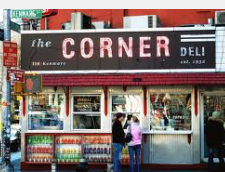Zoning: Expansion of Non-conforming Use and Dimensional Variance
Posted By Cliff Tuttle | July 31, 2016
No/ 1,274
Summary: A nonconforming use may be expanded by special exception under an appropriate ordinance from a deli to a restaurant and a reasonable dimensional variance may be granted to effectuate the change.
Tomino operates a take-out delicatessen in the City of Bethlehem that occupies a location that is 18 feet by 30 feet, with a total area of 540 square feet. The owner filed a zoning application for a special exception to expand the facility to 1,080 square feet and change the use to an eat-in restaurant, including room for tables.
The property is zoned RT High Density Residential District. The property had housed various non-conforming uses since 1926 and the Zoning Hearing Board (ZHB) had approved the change from an insurance office to deli by special exception in 1998.
The ZHB determined that the proposed changes met the general requirements for a special exception to change from a nonconforming deli use to a nonconforming restaurant use and that the change was consistent with the spirit, purpose and intent of the ordinance. It also granted a dimensional variance to permit the doubling of the floor space, since it deemed the increased floor space necessary to operate a restaurant.
On appeal from the Common Pleas decision affirming the Board’s decision, the Commonwealth Court stated: “With regard to the dimensional variance to increase the restaurant’s size beyond 50 percent, the ZHB determined that Tomino met all the applicable criteria for a variance. (Id. at 16, 22.) The ZHB also found that an unnecessary hardship would result if the dimensional variance were denied because, among other things, the building, which is a nonconforming structure with a nonconforming use, is “completely inadequate to operate a restaurant use.”
The Zoning Ordinance permitted a change from one nonconforming use to another by special exception, provided the applicant can prove that the nonconforming use can not reasonably be changed to a permitted use and that it will not result in degradation of the neighborhood due to increased traffic congestion, noise, smoke, fumes and the like.
The ZHB found that the property could not be converted to a conforming use and that change was beneficial because, among other things, without the expansion, the deli would ultimately be forced to close.
The Commonwealth Court stated: “We agree with the ZHB that the change from a deli use to a restaurant use is consistent with the spirit, purpose, and intent of the Ordinance and is consistent with the most appropriate use of the land, in that the deli existed as a nonconforming use and will continue in a similar capacity as a restaurant use. A property owner has a constitutional right to continue a nonconforming use. Richland Township v. Prodex, Inc., 634 A.2d 756, 767 (Pa. Cmwlth. 1993). The lawful, nonconforming use establishes in the property owner a vested right that “cannot be abrogated or destroyed unless it is a nuisance, or it is abandoned by the owner, or it is extinguished by eminent domain.” Pennridge Development Enterprises, Inc. v. Volovnik, 624 A.2d 674, 675 (Pa. Cmwlth. 1993). Tomino’s property rights have not been abrogated, destroyed, extinguished by eminent domain, or abandoned. Thus, Tomino has a constitutional right to continue the nonconforming use.
We agree with the ZHB that the proposed plan conforms with all applicable requirements of the Ordinance, except for the expansion beyond 50 percent, which is the subject of the dimensional variance request. No other zoning relief is requested or required. Thus, the ZHB correctly found that Tomino met the requirements in article 1325.07 of the Ordinance for a special exception.”
Because the applicant had met the criteria of the ordinance, the burden shifted to the objecting party (Dunbar).
Dunbar argued that Tomino did not establish an unnecessary hardship , since inter alia, the property could continue to be used as a deli. The Commonwealth Court disagreed.
“Here, we agree with the ZHB that Tomino’s expansion of the nonconforming restaurant is necessary for the reasonable use of the Property. Tomino demonstrated the difficulties the current establishment presents to the operation of the deli and the inadequacies of the building space, having only enough room for one refrigerated meat case, one refrigerated soda case, and one preparation area. Tomino also testified that he is unable to compete with other local businesses that have unlimited hours and menu items.
Curullo testified that the building’s square-footage is totally inadequate to conduct Tomino’s business. Curullo stated that Tomino needs an additional 540 square feet to install additional equipment, tables and chairs, and ADA-compliant restrooms and a handicap ramp. Curullo determined that the additional 540 square feet was “barely the minimum necessary.”
In Limley v. Zoning Hearing Board, 625 A.2d 54, 56 (Pa. 1993), the Pennsylvania Supreme Court held that a proposed public restaurant and bar was a natural expansion of the existing, nonconforming use as a private social club. The Court determined that the chief activity of the social club was the sale of food and beverages and that the activity would remain the same with the proposed restaurant and bar. Id. Because this use was similar to the existing use, it continued as a preexisting, nonconforming use and did not create a new and different use. Id. at 57.”
CLT




